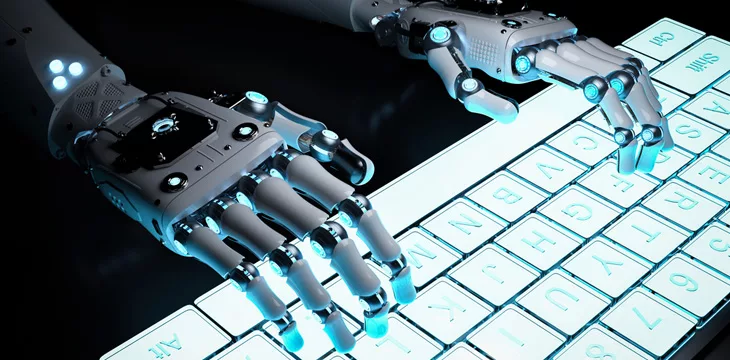|
Getting your Trinity Audio player ready...
|
Integrating artificial intelligence (AI) in workplaces has created a chasm in the work world. On one hand, there’s a fear that AI will replace jobs, especially in industries where automation seems inevitable. Additionally, there’s a group of workers who welcome AI in the workplace, believing that AI is more of a companion that increases efficiency than a human replacement that makes them redundant.
Balancing AI’s efficiency with employment concerns
The potential for AI to revolutionize back-office, administrative, and cross-departmental work cannot be overstated. It enables workers to pivot from mundane tasks, such as cross-department communication, to creating value for their companies.
Alex Hood, Chief Product Officer at Asana (NASDAQ: ASAN), says a pain point in modern workplaces is the time spent on ‘work about work.’ He estimates that half of our time at work is dedicated to this and believes that AI’s ability to reduce this significantly is “a great unlock.”
However, not everyone has the same enthusiasm for AI in the workplace. According to a report from ResumeBuilder, 37% of business leaders using AI say it replaced workers in 2023, and 44% anticipate layoffs in 2024 due to AI efficiency. A report from Asana echoed these sentiments, with 29% of employees believing their tasks are replaceable by AI.
“My advice for anyone is to understand how AI could impact your position in your industry right now,” said Julia Toothacre, a resume and career strategist at ResumeBuilder, “[Because] at least you [will] have an idea of what to potentially expect versus having no idea what’s going on.”
Those who help others find and transition into their next careers are not the only ones aware of the impact that AI will have on some jobs. Even tech giants like Microsoft (NASDAQ: MSFT) are making efforts to diminish the negative effects that AI will have on human labor.
Adapting to AI in the workplace
Microsoft and the American Federation of Labor and Congress of Industrial Organizations (AFL-CIO) have recognized the damage AI will do to some industries and have partnered so that they can proactively address the challenges and opportunities AI presents to the workforce. This partnership aims to educate labor leaders and workers about AI, incorporate their feedback into AI development, and influence public policy to support worker skills in an AI-driven economy.
Marc Cenedella, founder of Leet Resumes and Ladders, supports the approach Microsoft and the AFL-CIO are taking and says, “The companies that do fund the development of their employees are going to be better positioned [for technology-induced innovations].”
The emergence and integration of AI in our professional lives is already in motion. To navigate this new landscape, the best strategy is to adapt, learning to utilize the latest apps and services that have AI at their core. At this point, fighting against the tide of AI is counterproductive, as it is only expected to increase in the workplace.
But remember, AI systems still need a human behind them to execute operations, which means that one of the most effective ways to stay relevant in this AI-dominated era is by learning how to operate and prompt AI systems. By becoming proficient in AI technologies, workers can secure their place within this new paradigm, transforming potential threats into opportunities for growth and innovation.
In order for artificial intelligence (AI) to work right within the law and thrive in the face of growing challenges, it needs to integrate an enterprise blockchain system that ensures data input quality and ownership—allowing it to keep data safe while also guaranteeing the immutability of data. Check out CoinGeek’s coverage on this emerging tech to learn more why Enterprise blockchain will be the backbone of AI.
Watch: Artificial intelligence needs blockchain

 02-17-2026
02-17-2026 




